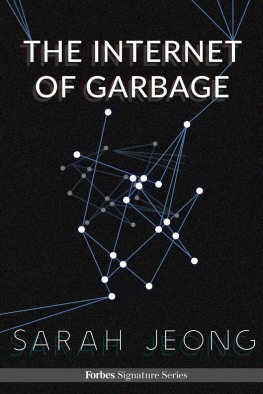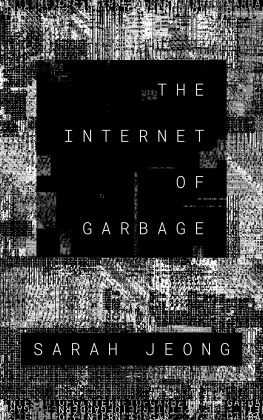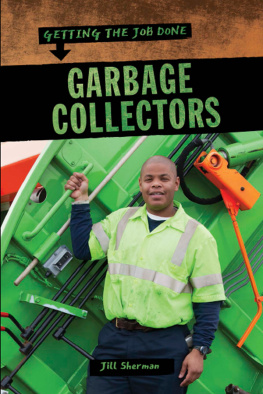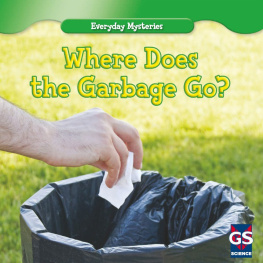Sarah Jeong - The Internet Of Garbage
Here you can read online Sarah Jeong - The Internet Of Garbage full text of the book (entire story) in english for free. Download pdf and epub, get meaning, cover and reviews about this ebook. year: 2015, genre: Romance novel. Description of the work, (preface) as well as reviews are available. Best literature library LitArk.com created for fans of good reading and offers a wide selection of genres:
Romance novel
Science fiction
Adventure
Detective
Science
History
Home and family
Prose
Art
Politics
Computer
Non-fiction
Religion
Business
Children
Humor
Choose a favorite category and find really read worthwhile books. Enjoy immersion in the world of imagination, feel the emotions of the characters or learn something new for yourself, make an fascinating discovery.
- Book:The Internet Of Garbage
- Author:
- Genre:
- Year:2015
- Rating:3 / 5
- Favourites:Add to favourites
- Your mark:
- 60
- 1
- 2
- 3
- 4
- 5
The Internet Of Garbage: summary, description and annotation
We offer to read an annotation, description, summary or preface (depends on what the author of the book "The Internet Of Garbage" wrote himself). If you haven't found the necessary information about the book — write in the comments, we will try to find it.
The Internet Of Garbage — read online for free the complete book (whole text) full work
Below is the text of the book, divided by pages. System saving the place of the last page read, allows you to conveniently read the book "The Internet Of Garbage" online for free, without having to search again every time where you left off. Put a bookmark, and you can go to the page where you finished reading at any time.
Font size:
Interval:
Bookmark:
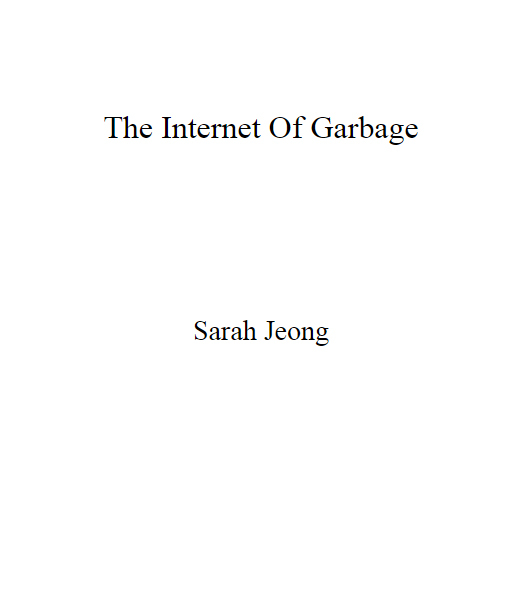
Copyright 2015 Forbes. All rights reserved.
Cover Design: Uyen Cao
Edited by Jennifer Eum and Annabel Lau
I. The Internet Is Garbage
Contract workers in San Francisco, processing thousands of complaints a day. Sweatshops in the Philippines, where outsourced labor decides whats obscene and whats permissible in a matter of seconds. Teams of anti-spam engineers in Mountain View, adapting to the latest wave of bots. An unpaid moderator on Reddit, picking out submissions that violate guidelines.
So much of the Internet is garbage, and much of its infrastructure and many man-hours are devoted to taking out the garbage. For the most part, this labor is hidden from plain sight. But in recent years, the garbage disposal has broken down. The social media companies have a harassment problem, the pundits have declared.
However, large-scale harassment campaigns are hardly new, and the barrage of crude and cruel messages and undesirable content is only a small part of what makes a targeted campaign a frightening experience for the victim. Yet this part of the equationthe part that is seemingly under the control of Silicon Valleyhas received the most attention from the media, because it is the most public, visible, and archivable. And as tech companies repeatedly fail to address the problem to everyones liking, the problem looms ever larger in the public imagination.
The publics understanding of speech online has undergone a serious paradigm shift. Even in tech-centric communities generally supportive of free speech on the Internet, there is a pervasive feeling that harassment must be rooted out and solved. Anonymity and freedom of speech have become bad words, the catchphrases of an old guard that refuses to open its eyes to a crisis for the Internet.
But is there really a crisis, and if so, what is the nature of this crisis? If the Internet itself is under threat, it is in essence under the same threat its been from its inception. The Internet isnt breaking. Beneath the Wikipedias and Facebooks and YouTubes and other shiny repositories of information, community, and culturethe Internet is, and always has been, mostly garbage.
What do I mean by garbage?
Its a broad category, one whose boundaries are highly dependent on the context. The definition shifts from platform to platform, from year to year, even from week to week.
Garbage is simply undesirable content. It might be content meant to break the code of the site. It might be malware. It might be spam in the specific sense of robotically generated commercial text. It might be a specific threat directed towards another user. It might be a vague threat. Or it might be a post sprinkled with a few too many four-letter words. In heavily moderated communities, posts that are deemed to be merely off-topic may be deleted. Posts that might be neither frightening nor offensive nor off-topic can also be deemed to be garbage. On the SomethingAwful forums, postings that are judged to have little value to the community are referred to by the evocative name, shitpost.
Even in the most anarchic of spaces, there will be content classified as garbage. On 4chan, a site with a reputation for permitting anything, doxing (posting addresses or other personal information without permission) and forum raids (orchestrating a campaign of vandalism or harassment on another site) are forbidden. On the Silk Road, once a Tor-hidden service that allowed people to buy and sell drugs, listings for guns were forbidden. On both sites, child pornography is and was forbidden.
No matter how libertarian, how permissive, and how illegal the site is, there is always content that is deemed to be unworthy of staying on the site. It must be deleted. Perhaps it is because the content is illegal (e.g., child pornography). Perhaps it is dangerous to other users (e.g., malware). And perhaps it simply does not comport with the mission statement of the communitythat is, it derails from the purposes and goals of the platform. Whether it is primarily a community of like-minded people (bulletin boards, forums, and mailing lists) or primarily a profit-driven social media company (Facebook, Twitter, Instagram), there is some content that makes the platform simply less good. The standards for good differ, but nonetheless, the rule is the same. Some content contributes value, other content detracts. Each corner of the Internet works actively to discourage or weed out the trashotherwise the garbage will choke it up and kill it.
Spam As Garbage
Today, nothing is as uncontroversially garbage as spam. Yet the definition of spam is nebulous. In 1975, Jon Postel, a computer scientist with so much control over the early Internet and held in such high regard that he was known as the God of the Internet before his death in 1998, wrote the document On the Junk Mail Problem. The problem that the RFC 706 document discussed was actually speculative in nature, and the junk mail was described as undesired, misbehaving, or simply annoying material.
The term spam, which today is interchangeable with junk mail, started off as simply being annoying behavior. On early chat systems, people would often type spam, spam, spam, spammity spama reference to a Monty Python sketch where a couples breakfast is repeatedly interrupted by Vikings singing about spam. If users hit the up arrow, the line would replicate itself, and they could then spam the chat room repeatedly with very little effort. Finn Brunton, professor of media, culture, and communication at New York University, writes in Spam: A Shadow History of the Internet:
In the bandwidth-constrained, text-only space, as you followed exchanges line by line on a monochrome monitor, this was a powerful tool for annoying people. You could push all the rest of the conversation up off the screen, cutting off the other users and dominating that painfully slow connection. The word spam served to identify a way of thinking and doing online that was lazy, indiscriminate, and a waste of the time and attention of others.
In early years, in fact, it wasnt all that clear that spam should be proactively deleted or filtered. The debate was framed as a free speech issue, where the most libertarian standpoint, according to Brunton, was one that permitted any speech except that which actively interferes with Usenets ability to functionthat is, that which would restrict the speech of others. For Brunton, this is summarized best in Dave Hayes 1996 An Alternative Primer on Net Abuse, Free Speech, and Usenet:
Example of net abuse:
- Posting articles that directly crash the news server that is to inject the post into the news stream.
- Posting articles that contain control messages designed to crash news servers.
- Directly hacking into a news server to disable it.
Examples of things that are NOT net abuse:
- Volumnous [sic] posting
- SPAM
- Excessive cross-posting
- Off-topic posting
- Flaming or arguing
By the 2000s, commercial spammers like Laura Betterly would defend themselves on the basis that sending out millions of unsolicited messages was what America was built on. Small business wonders have a right to direct marketing. In fact, they would characterize the vitriolic backlash against spam as hate groups that are trying to shut down commercial email.
But today spam is largely understood as robotically generated text issued from botnets of compromised computers that have been unknowingly recruited into transmitting mind-bogglingly large amounts of unwanted messages advertising Viagra, genital enhancements, Nigerian get-rich-quick schemes, or linking to malware in order to steal passwords or simply recruit yet another computer into the mechanical zombie horde. Spam has become the realm of Russian crime rings (as documented by Brian Krebs in many places, including his book
Font size:
Interval:
Bookmark:
Similar books «The Internet Of Garbage»
Look at similar books to The Internet Of Garbage. We have selected literature similar in name and meaning in the hope of providing readers with more options to find new, interesting, not yet read works.
Discussion, reviews of the book The Internet Of Garbage and just readers' own opinions. Leave your comments, write what you think about the work, its meaning or the main characters. Specify what exactly you liked and what you didn't like, and why you think so.

